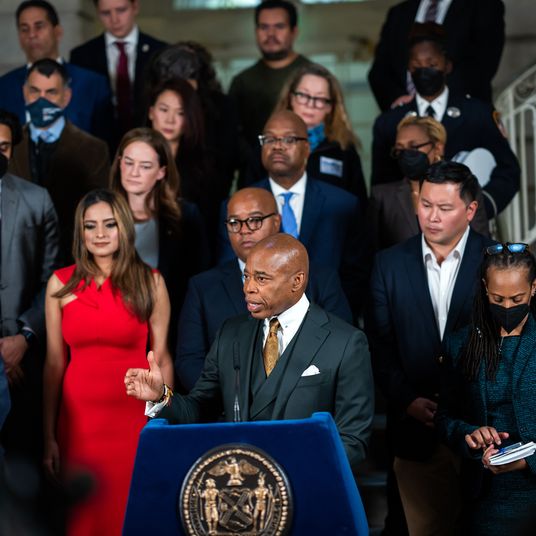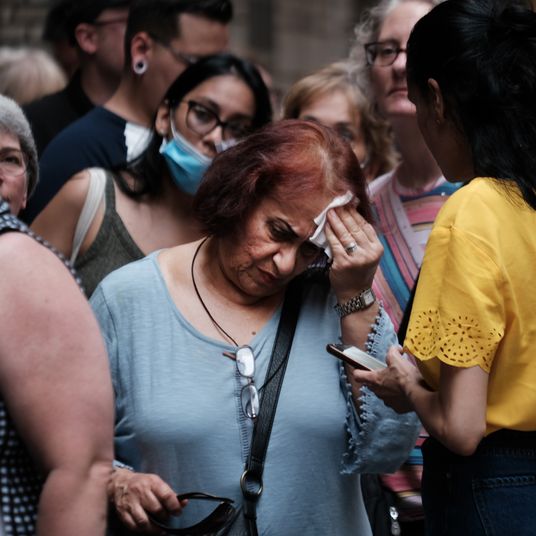
Since the U.S. Supreme Court reversed Roe v. Wade about two years ago, voters in seven states (Kansas, Kentucky, California, Michigan, Vermont, Montana, and Ohio) have been given an opportunity to weigh in on abortion policy. Pro-choice forces have won all seven. With Republican-controlled state legislatures imposing forced-birth regimes in large swaths of the country and Democrats envisioning a blue wave of voters seeking to restore abortion rights, efforts to secure November 2024 ballot measures have multiplied. And while it’s unclear at this juncture exactly how many states will hold votes on abortion policy, the odds of a continued pro-choice winning streak remain pretty good, according to the available polling.
Four states will definitely hold ballot tests on the issue. Two are in safely blue states — Colorado and Maryland — though Colorado’s will require a 55 percent supermajority. Both initiatives would establish a straightforward state-constitutional right to an abortion without reference to any gestational stage (e.g., the viability standard set out by Roe and Casey), and Colorado’s would also repeal a prior ban on state funding of abortions. Though no public polling on these initiatives is available, Maryland’s is considered a slam dunk and Colorado’s is expected to win.
Two abortion-right initiatives in red states are also likely to be approved; the most abundant polling is on Florida’s; the proposed constitutional amendment would overturn the state’s current six-week abortion ban and restore the Roe/Casey standard allowing pre-viability abortions. As FiveThirtyEight notes, all five polls on the amendment show it leading by a significant margin, with the average being 56 percent in favor, 26 percent opposing, and 17 percent undecided. The most recent survey, an early June poll from Fox News, gives the initiative a 69 to 27 percent lead. A 60 percent supermajority is required.
South Dakota’s proposed constitutional amendment would restore Roe’s original trimester scheme governing abortion restrictions (which was later eliminated by Casey in favor of a simple viability standard), allowing health-related restrictions in the second trimester of pregnancy and a ban in the third trimester (with a life-and-health-of-the-mother exception). This measure is so distant from an abortion-rights guarantee that several major reproductive-rights advocacy groups aren’t backing it. But its proponents are marketing it as a compromise measure, and the one public poll available (from the University of South Dakota in late May) shows it leading by a 53 to 35 percent margin.
Many eyes are on likely abortion-rights measures in the presidential and U.S. Senate battlegrounds of Arizona and Nevada. Arizona’s proposed state-constitutional amendment restoring the Roe/Casey viability standard picked up steam in April when the state’s Supreme Court restored a harsh and total 19th-century abortion ban; the Republican-controlled legislature quickly overrode it with a 15-week ban, but alarms went off in the electorate. A May CBS News poll showed the proposed amendment leading by a three-to-one margin (65 to 21 percent), and an early June Fox News poll gave the initiative an even bigger lead of 70 to 27. Nevada has not enacted any abortion restrictions since Roe fell, but a measure to enshrine a right to pre-viability abortions in the state constitution is expected to make it to the ballot. A June Fox News poll showed it leading by a huge 73 to 22 percent margin. Nevada law requires that constitutional amendments offered via ballot initiatives pass twice before becoming effective, so the issue is likely to come up again in 2026.
There are four other states where a November ballot initiative could appear if petition signature collections meet the standards set out in each jurisdiction. Like the South Dakota initiative, a proposed constitutional amendment in Arkansas would fall short of a full restoration of protection of pre-viability abortions, much less an unconditional right to choose, and has thus been denied full support from some reproductive rights advocates. But in a deep-red state with a near-total abortion ban, it remains highly controversial. There’s no specific public polling available on the initiative, but past surveys have shown a slim pro-choice majority in Arkansas despite the universal opposition of Republican statewide election officials.
Proponents of a state constitutional amendment in Missouri protecting pre-viability abortions claim far more petitions than they need for ballot access. A February 2024 poll from St. Louis University showed 44 percent of Missouri voters favoring the amendment and 37 percent opposing it.
In Montana, a state where voters defeated a restrictive ballot measure in 2022, abortion is legal as Republicans seek ways to circumvent pro-choice court decisions. It’s unclear whether proponents of a constitutional amendment to establish a clear right to pre-viability abortions will succeed in placing it on the ballot. If they do, a 2023 survey from Middle Forks Strategies shows 60 percent support for abortion rights, but significant resistance to constitutional amendments.
The most complicated situation over abortion ballot initiatives is in Nebraska, where two competing constitutional amendments seem likely to make the ballot. One would enshrine the current state ban on abortions after 12 weeks of pregnancy while enabling further restrictions by the legislature. The other would re-establish a right to pre-viability abortions. Both measures could pass, in which case the one securing the most votes would be added to the constitution. Polling by the ACLU in late 2022 showed a solid majority of Nebraskans opposing a total ban on abortion, though it’s unclear how well the more limited ban likely to be on the 2024 ballot would fare.
All in all, pro-choice ballot wins seem likely in Arizona, Colorado, Florida, Maryland, Montana, Nevada, and South Dakota, while the situation is iffier (in terms of ballot access, voter passage, or both) in Arkansas, Missouri, and Nebraska. You could argue, of course, that presidential, congressional, and state elections in November will in part be ballot measures on abortion rights given the partisan polarization that exists on this issue. A sweep for pro-choice Democrats in those offices is less likely.
More on life after roe
- Southern Baptists’ Attack on IVF Will Likely Backfire
- The Supreme Court Didn’t Crush Abortion Rights for Once
- Is Economic Populism Biden’s Best Hope for Beating Trump?






























